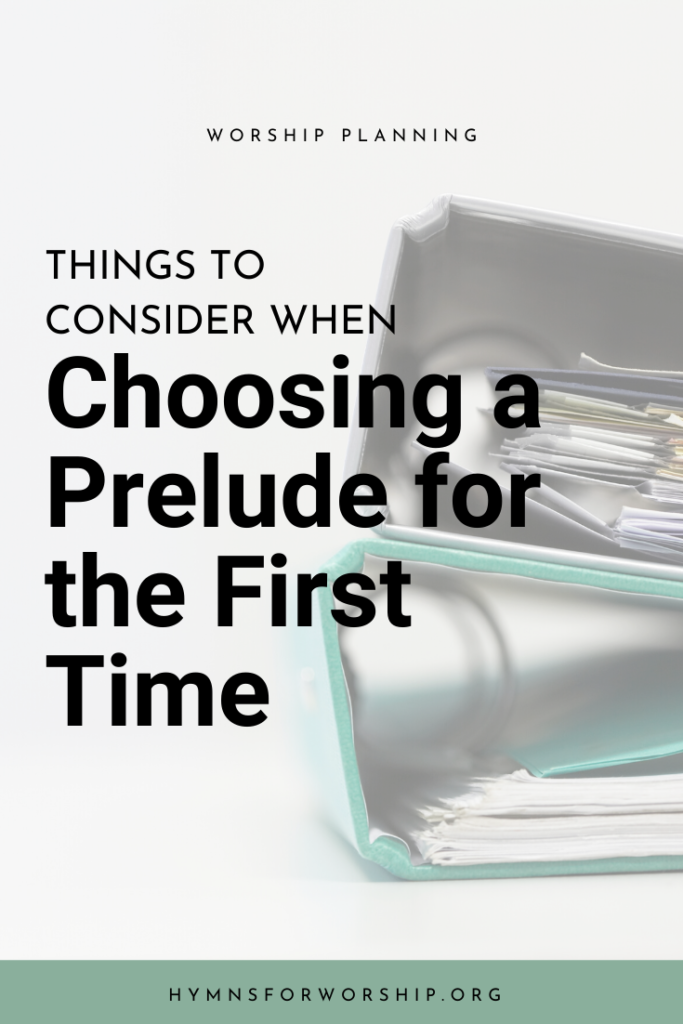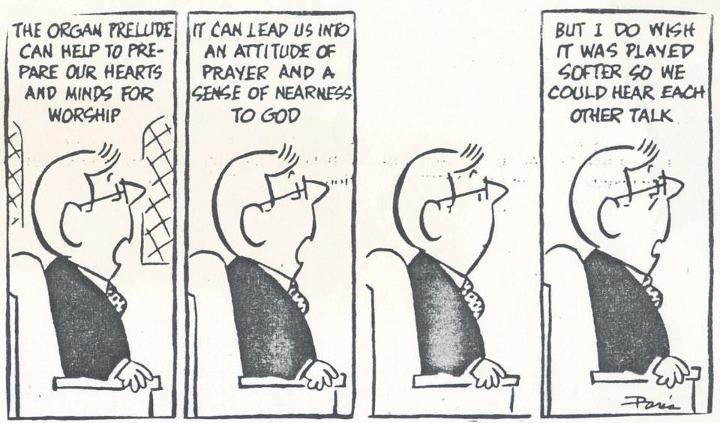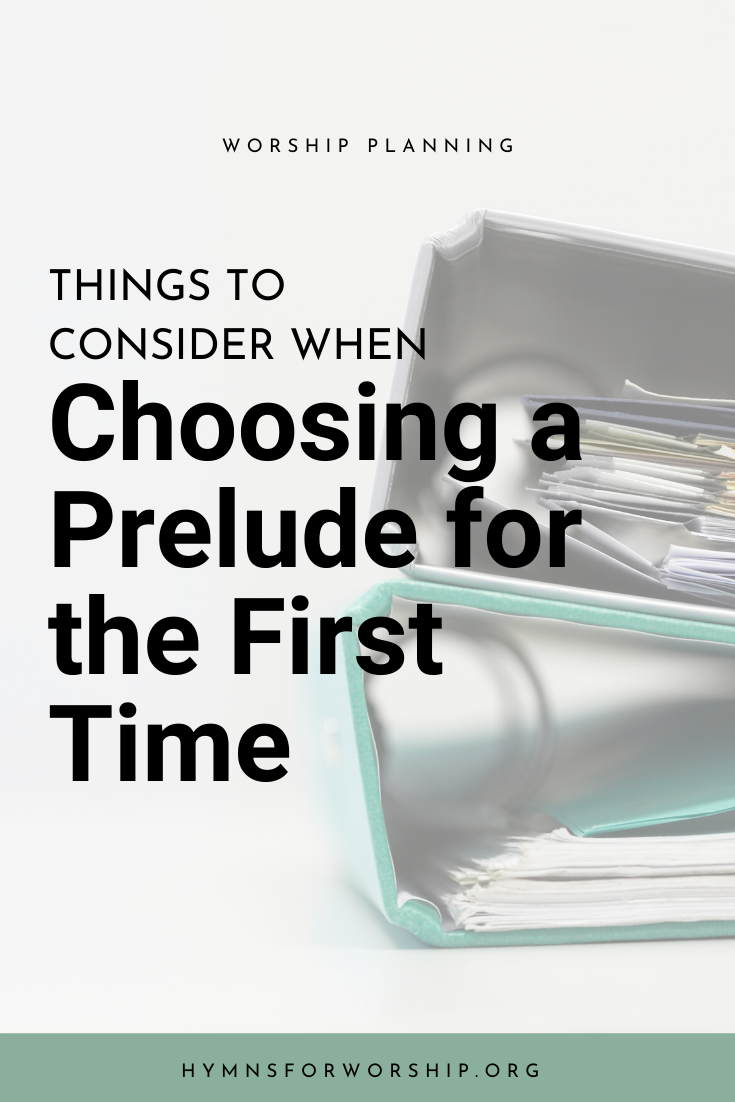As an organist I’m always expected to prepare at least three musical selections every Sabbath. These selections are often named in the church bulletin as prelude, an offertory, and a postlude. To some this might be an easy task, but a great deal of thought comes with choosing just what to play.

These three genres of church music have different and specific functions, yet works toward a united goal, that is, to facilitate worship.
A student asked me before, “How do you know what to play?” I have yet a one-sentence answer to give to her, but I do know that I have a thought process I go through every time I need to line up my repertoire for church.
For the purpose of appealing to your attention, I will go through the process one genre at a time. Let’s start with the prelude.
Questions I ask myself
1. What is the function of the prelude? This is really helpful for me because it becomes the standard guide in choosing music. I always remind myself that the prelude is actually the beginning of the worship service. I have the privilege of helping to induce a serious and worshipful mood. Hence, the music I choose should set the people to prepare for the consideration of sacred things.
2. What musical style best matches to this function? Normally I do not choose brilliant, show-offy types of music. Neither do I choose the sugary and sentimental. A short piece, 2-3 minutes long, with a satisfactory climax but lots of meditative sections are usually a good choice.
3. Is the opening hymn familiar to the congregation? If not, should I use the prelude as an educational point? If the main opening hymn is uncommon then I would take the liberty to play an organ setting of the same hymn, either improvised or prepared. This introduces the ears to the main hymn, making it more familiar and aids them to be able to sing it better. Repetition then becomes the key.
4. Does the congregation need to be taught how to keep silent? I hardly recommend this, but it’s something that has worked for me many times. Every now and then, I would find myself playing for a rowdy congregation who treats the period between Sabbath school and Divine Worship like a social club or a loud family reunion. They gab and laugh and giggle in the sanctuary and never know when to stop!
So I start off by playing soft music. And I would hear this incessant hum of the crowd talking. The more I increase the volume, the lull of the talking mass gets louder too. And so I would play louder and louder. As an immediate response, they would talk louder and bolder, until I can almost audibly hear the details of the conversations. Here is when I would surprise them with a subito piano. Almost always, the congregation gets the message and stops talking.

5. Do I have enough time to practice this? I consider more difficult and complex pieces if I have more time. If I only have a few minutes to make a choice, then I would probably choose manual-only pieces or music with sparse pedal lines. Regardless of whether I have more time for practice or not, I see to it that I still choose substantial, meaningful and compelling pieces of music.
6. Do I have the resources that I need? It is important to have a collection of pieces to choose from. That way, you can always compare and contrast pieces and find what is suitable. I’m frugal, so I always try to find ways and means to get things for free or cheap without compromising quality.
Talking about getting resourceful, I would go to IMSLP and Scribd to see whether they have what I’m looking for. I would also go to Youtube and search for performances that would best suit my taste. One time I found this video of a gorgeous setting of a hymn that I really liked. The music sheet was not available anywhere, so I messaged the owner of the channel asking him where he got the music. He promptly responded, asking for my email. To my surprise, he emailed me not only the hymn setting, but the actual book where it came from and many other organ music scores!
7. I don’t have the pieces. What do I do? I’m not a master improviser, but I just keep things simple. I would choose the appropriate hymns and just play each stanza using different stops each time. Or play the melody with a solo stop (on the choir or great), and the left hand outlining the chord on a different keyboard with a softer sound (mostly on the swell).
8. How soon should the music coordinator / worship coordinator / church bulletin people know? Normally, they want to know the title of the piece Wednesday, or the latest Friday morning. This depends of course on the level of organization the church you’re playing for has. Once I give them the title of the music I’m playing, I don’t give myself room to change that, unless I really have to.
So I don’t let the decision making take a lot of time. I give myself a day, mostly Sunday, in choosing the piece so that I have ample time to practice it during the early part of the week. By then, I’ll see whether it is a good fit or not. That way, when I give the title to the coordinators, it’s final. It will also help to establish in their mind that I’m reliable and consistent, which is always a plus.
With enough practice, these questions will come automatically and the answers to it even quicker. It’s always great to build a system. Most of the questions I didn’t have to ask myself every time. And over time, you’ll be able to “know just what to play” appropriately.
Question: What’s your thought process when choosing a prelude? I would love to know! Please share it in the comment section below.
Like this article? Share it!


